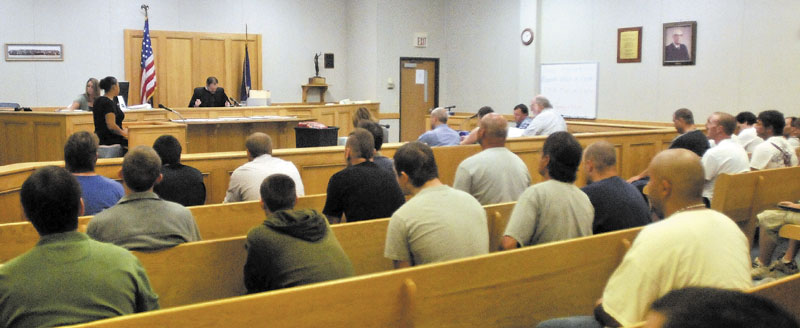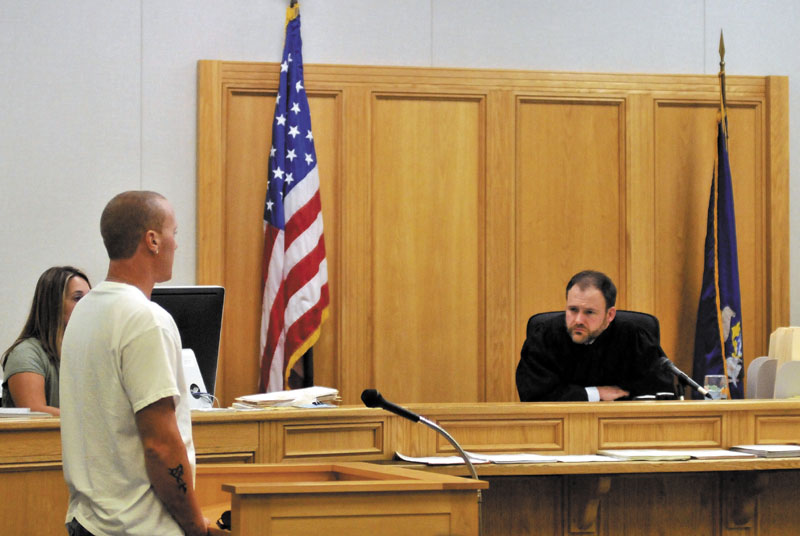WATERVILLE — The middle-aged man held nothing back as he stood before Judge Charles Dow.
He said he escalated an argument with his partner, grabbed her by the arms and then by her hair, and began pounding her face into a cabinet. Then he threw her on the floor.
“I picked her up and continued to pound her face into the window frame and window sill, giving her a very bad concussion. I smashed her face through the window, cutting her badly on the face and arms.”
That abuse, he said, left her physically and emotionally scarred. Forever.
The man appeared recently in Domestic Violence Court at the Waterville District Court, where, monthly, people convicted and sentenced for domestic violence crimes must go before a judge to show that they are complying with court-mandated probation conditions.
Two area domestic violence incidents this year, in Dexter and Winslow, left six people — two women, two children and the two men who committed the violence — dead. More than half of Maine homicides are domestic violence related, according to the state Attorney General’s Office.
The court imposes conditions of probation for those convicted of domestic violence crimes that typically includes attending Menswork, a 48-week, two-hour program under the umbrella of the Family Violence Project that seeks to keep victims safe, stop violence and teach men to be accountable. The program is certified by the state Department of Corrections.
In Domestic Violence Court, participants face not only a judge, but also a team of Menswork facilitators, an assistant district attorney and probation officials, all of whom are monitoring their progress.
The offenders must describe their crime in detail, identifying their victim by name and relationship. They must use language that shows they take responsibility for their actions.
“The purpose is to hold offenders accountable,” said Mary Ann Lynch, director of court information for the Maine Judicial Branch.
Participation in the program is a condition of probation, imposed by the court as part of a sentence, according to Lynch.
Offenders who don’t adequately participate in the program can lose their probation and be sent to jail, she said.
Held accountable
In the recent court session, 34 men and one woman stood before the judge, one by one, during a 2 1/2-hour session.”How did you land yourself in Domestic Violence Court?” Dow asked each participant.
The middle-aged man who described beating his wife had attended 48 weekly Menswork meetings, at $35 a session, nearly completing his time in the court.
Dow told him he might not see him for his last session.
“But I want to wish you well and thank you for your participation,” he said.
Dow asked the man if he wanted say anything about his experience, having come so far in the court program.
The man said when he first started with the court and Menswork, he thought he did not belong.
“I thought Menswork was thinly disguised brainwashing and I wanted no part of it,” he said.
But he had no choice; he had to be there every week, so he decided he’d listen, he said.
What he learned, ultimately, is that he is not the man he thought he was.
“I need to be here. The best thing you can do for yourselves is to keep an open mind. If you don’t get anything out of it, then you’re only cheating yourself.”
He received a round of applause from his peers.
Participants in Menswork get help in recognizing that they have a problem, admitting their abusive behavior and recognizing that it is a crime. They also are taught to accept responsibility for their actions and learn that, even if negative circumstances do not change, they can still change their positions and emotional reactions to those circumstances.
Domestic Violence Court relies heavily on reports from Menswork and probation officials who closely monitor participants’ attendance, attitude, and “check-in” reports in which they introduce themselves, describe their crimes and how they are changing their behavior in situations that typically cause them to become violent.
In Domestic Violence Court, an unusual method of feedback is allowed: offenders awaiting their turn to address the court are invited by the judge to comment or interject when an offender at the bench uses inappropriate language to describe the crime.
One man arrived at the 1 p.m. session late, asking Dow if he could skip the session because he had a job interview.
Dow, respectful of each participant but tough when the situation called for it, said the man had to stay.
“You can’t waltz in late and say that you have to leave early,” he said.
Later, when it was the man’s turn to address the court, he described how he called his partner names and pushed he, causing her to fall down a flight of stairs.
“The victim has a name,” a man called from the back of the room.
The offender said he knew it was wrong to push her, but it’s not like he jumped on top of her and started hitting her. His comment drew more criticism from his peers, who said he was minimizing his actions.
Dow told him that the last time he checked in with the court, his reporting was abysmal, that this one was better, but that he was digging himself a real hole.
The way he checked in Thursday and responded to others in the group by minimizing his action of throwing the woman down the stairs was a formula for failure, and absolutely unacceptable, Dow said.
“You can’t just show up and minimize, blame, justify and deny, and expect to go through the next week and the next week and the next week,” he said.
Dow told him he had to take part in Menswork and Domestic Violence Court, but he would not be able to continue with the court program if he did not do the work.
When some offenders did not show up for court, Dow called for their arrests. “There’ll be a bench warrant — no bail.”
The whole story
In Domestic Violence Court, offenders may not dilute descriptions of what they did to their victims. The language is blunt, forceful and eye-opening.
In the recent court session, they described violent acts they inflicted on their partners, wives and other family members.
They said they threatened, intimidated, and frightened their spouses and children by abusing them physically, emotionally and verbally.
They described kicking and strangling their partners and threatening to kill both them and their children. They said they called their partners “whore,” “slut,” and other names.
One man said he escalated an argument with his partner, called her names, threw items at her and violently picked her up and pushed her into a corner.
“I also burned her forehead with a cigarette,” he said. “That’s how I ended up here.”
He told Dow he felt a lot of shame for what he did.
After seeing the program as a challenge to trick everyone — the court, the program and police — he finally realized it was ridiculous to think he was better than anyone else, he said.
“I don’t wish to be like this anymore,” he said.
He said he finally opened up, and the program has worked for him.
Lynch, the information director for Maine courts, said Domestic Violence Court started in 2002 in Maine with a grant from the U.S. Department of Justice, and expanded to include Waterville District Court in 2004. It is now in 11 courts across the state.
Officials have no statistics showing long-term effectiveness of the court program or the recidivism rate, she said.
“We believe, anecdotally, that while the offenders are in the program and being supervised, it is effective,” she said.
Dow said most of those who attend have suspended sentences and some have served time in jail. The program is about accountability and compliance, he said:
“The reality is, if you comply, you stay out of jail.”
Amy Calder — 861-9247
acalder@centralmaine.com
Send questions/comments to the editors.





Success. Please wait for the page to reload. If the page does not reload within 5 seconds, please refresh the page.
Enter your email and password to access comments.
Hi, to comment on stories you must . This profile is in addition to your subscription and website login.
Already have a commenting profile? .
Invalid username/password.
Please check your email to confirm and complete your registration.
Only subscribers are eligible to post comments. Please subscribe or login first for digital access. Here’s why.
Use the form below to reset your password. When you've submitted your account email, we will send an email with a reset code.